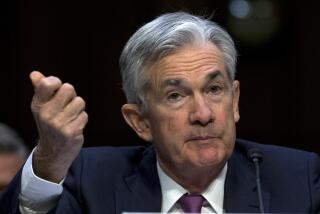Interest Rates
- Share via
In a column, Paul Craig Roberts has pointed out the inconsistencies of Federal Reserve policies on interest rates (“The Fed Grasps at Crackpot Interest-Rate Theories, and Real People Pay,” Op-Ed Page, Sept. 14).
If wage rates increase, it is considered inflationary because such increases are passed on to consumers. On the other hand, if interest rates are increased, it is considered a deflationary move.
These views are inconsistent because if wage increases force price increases, so should higher interest rates. Suffice it to say that either or both factors can slow the economy if the rise is persistent.
This country deserves a move towards lower interest rates. It will spur investment in new productive facilities, and will help by reducing the cost of financing the deficit.
Politicians should also bear in mind that no one likes to pay taxes when interest rates are at double-digit levels. At such rates, they prefer to lend money to the government in lieu of taxes.
High interest rates distort the distribution of income by favoring owners of capital and placing a burden on lower classes.
LOREN W. JOHNSON
Lake San Marcos
More to Read
Inside the business of entertainment
The Wide Shot brings you news, analysis and insights on everything from streaming wars to production — and what it all means for the future.
You may occasionally receive promotional content from the Los Angeles Times.










